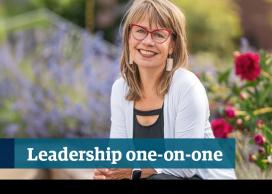Peter Smailes is Vice-President, Finance & Operations. He is responsible for leading the Comptroller department, Financial Operations, Treasury and Safety & Risk Services as well as UBC Facilities (Infrastructure Development, Energy & Water Services, and Building Operations) across the Vancouver and Okanagan campuses.
As part of his portfolio, he serves as a board member and oversees the university’s relationship with UBC Investment Management Trust, which manages the endowment and staff pension plan, and UBC Properties Trust which develops and manages real estate assets for the benefit of the university.
Peter was promoted to Vice-President in July 2018. Prior to that he served as the UBC Treasurer for 10 years and Associate Treasurer for 7 years.
Q1. What quality do you most admire in a leader?
PS: In any organization there are so many voices that are vying for our attention. The greatest leaders I have seen are able to really rise above the day-to-day and focus on strategy. They are able to focus on the long-term and hold that focus — building an environment where their people can rely on a clear vision, and feel supported to take smart risks that can advance the organization.
Q2. What makes you laugh?
PS: Clever humour, things that make you stop, think, and look at the world differently. There’s a lot to laugh about: John Cleese in his later career, even some of Robin Williams. But don’t ask me to do my silly walk, I’m not much of a fan of slapstick.
Q3. Who inspires you, and why?
PS: Honestly, it has changed a bit over time. This may be from the vantage point of age and experience, but the group I have come to find really inspiring is our student leaders and student board of governors. When you look at the world’s issues, like climate change or the political environment, you can start to feel down; but when you meet these students and see the world from their perspective, it renews our hope and gives our work purpose.
Q4. For you, what makes UBC different?
PS: In a word, complexity. While I recognize some of our complexity comes by choice — and we’re trying to simplify where we can — an organization the size of UBC, serving our diverse constituencies, will always have a lot of complex moving pieces and relationships. It allows for fascinating problem solving that makes for very rewarding work.
Q5. What is the most important lesson you’ve learned?
PS: Many years ago, in a former department, we had an issue that we thought we could handle ourselves. We were wrong, and it completely blew up. It took years to regain the organization’s trust. But I learned if you are transparent, people will come to your side and the trust can be restored.
Being transparent with people can feel risky, but underneath, we all want the same thing: for UBC to be a great university. There is a remarkable shared vision at every level of this university — even if we have different ideas on how to get there. It comes across in different ways, but it’s remarkably consistent.
Q6. How do you like to recharge?
PS: I have had the good fortune and opportunity to travel. When I was much younger I was more adventurous: for example I circumnavigated South America with a backpack by myself for six months and crewed on a sailboat from San Diego to Tahiti; three of us spent 28-days out of sight of land. You may argue whether these were smart risks, but they were fundamental to who I became.
Today, my wife and I still love to travel, though perhaps with a little less adventure in the mix. I still prefer to step away from the day-to-day and gain a little bit of separation that opens new doors and reminds me just how vast the world is outside of our routines.
Q7. What is the best advice you were ever given?
PS: A number of years ago I was deeply involved in a crisis at work that I found incredibly stressful. A senior lawyer I was working with took me aside and told me to keep doing what I was doing and trust my instincts; we would get through it and ultimately I would look back on this period as an incredible learning experience. He was right, and to this day I can still vividly recall that conversation.
Q8. What do you value in your colleagues?
PS: I am truly amazed by the people I get to work with. At one board of governors meeting, I was completely stumped by a question on strategy from a student representative that no one else on the committee had even considered.
When people — from any position on the team — can politely share their honest opinion, it helps us both. It surfaces issues and allows us to deal with them, builds trust, and makes for strong relationships.
When we don’t need to second-guess people’s opinions and reactions we can move faster and build better solutions. As I have said, UBC is a complex institution and it takes the whole team to maximize our potential.
Q9. What do you hope will be your lasting impact at UBC?
PS: I hope people will think of me as someone who helped us all to build more trust. We spend a lot of time doing things that are not efficient because we don’t completely trust one another — we choose to do it ourselves rather than trusting others. But, it can be different.
I think a great example of trust building is our efforts at procurement modernization with the faculties. We have shown that when you trust people and you make good on your promises, people will trust you. Together we make a better UBC.
Q10. If you could have a super power, what would it be?
PS: My son used to ask me this. I used to say France… it’s a perfectly-sized super power for my needs. (Dad jokes: the glue that builds families.)
So, he’d have a groan and I’d have a little laugh… and then I would say that I think I would like to be Green Light Man. Wherever I go, whatever the hour, every light would turn green and I would never have to stop. I like to go places and do things, and being stopped at a red light is not helping.
Q11. As one of the sponsors for UBC’s Integrated Renewal Program (IRP), what will this new change mean for the university long-term?
PS: The IRP is really interesting and has such potential — it’s really going to become what we can make of it.
For most of us, the biggest change will be that the system will be cloud-based — that means no more deep customizations and no more rocky upgrade paths because of those customizations. Our main business tools will always be current and updated so instead of spending energy keeping an older technology functioning, we will be able to look forward to maximizing the potential of our new cloud-based system.
We’re moving through a period of constant technological change. Being cloud-based will allow UBC to keep up with the world. Whether that’s through easier integration with systems that haven’t yet been imagined or absorbing new capabilities that will change how our information serves us.
Q12. What is your future vision for the Vice-President Finance & Operations (VPFO) portfolio?
PS: The VPFO portfolio is an integral part of the university. We are the enablers of the academic mission. We manage the university’s funds and keep the money moving to core activities like research and teaching as well as providing critical services like payroll and purchasing. We pave the roads and mow the lawns, maintain the pipes and ensure everyone has power. We keep our facilities clean and aim to lead in environmental design. We build safe, visionary buildings for living and learning and open our campus as a living lab to demonstrate the possibilities of what can come next.
The future is a place that is always coming into view. Our job is to be looking over the next hill, as stewards of the university, to make sure that what we create today will serve us and the generations to come.
Published: August 1, 2019
Interviewed by: Chris Freek, Director, Communications & Engagement, VP Finance & Operations (VPFO) Portfolio



